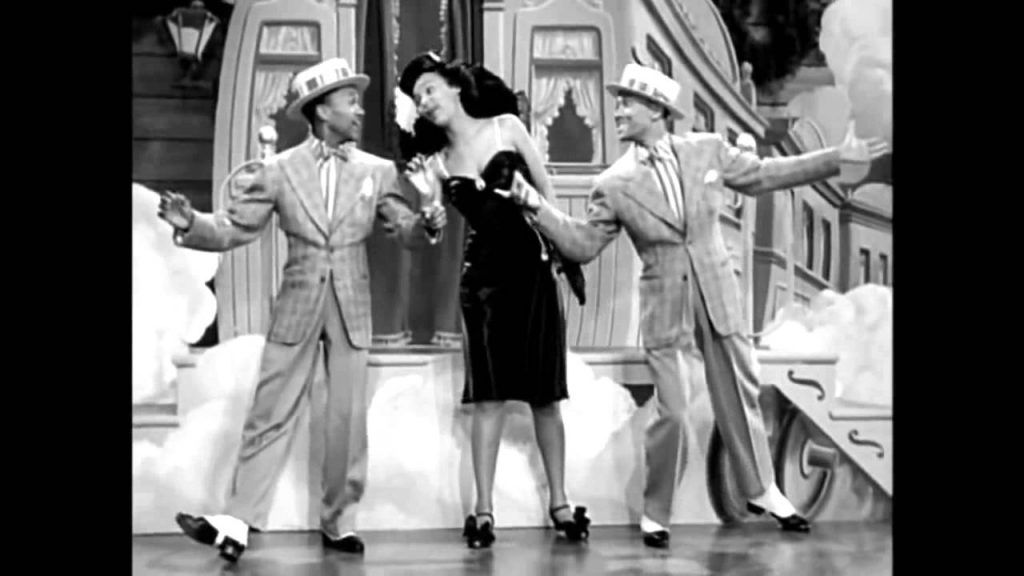It’s the evening of March 30, 1955. It’s the night of the 27th Academy Awards in Hollywood California. The celebrities are arriving in their limousines, and emerging from one of these, herded with blinding flashing lights, is a star. This star, from Cleveland, Ohio, is living out her dream. She has been nominated for the Best Actress award. Tonight, she’s making history. This woman is Dorothy Dandridge, and just for her being nominated, she is making history. Dorothy is the first African-American woman ever to be nominated for this award. And this nomination changed the way Americans thought, at least for that night. That Oscar would look so befitting in her hands. Her photo holding that Oscar from that night would be on every cover of every magazine in the country by the morning. Unfortunately, we never got to see that photo, because Dorothy did not win that night.

Dorothy Dandridge, born on November 9, 1922, first began her start in show business with her sister and another young woman in a musical trio. Once they gathered enough attention, they began performing at the Cotton Club during the 1930s.1 The famed Cotton Club was the dance club based in Harlem, New York where the most popular black singers and dancers performed, such as Cab Calloway and Duke Ellington, and it was where Dorothy Dandridge met her future husband. Here, Dorothy and her trio became so popular that they decided to take their show on tour to England. She finally married her husband, Harold Nicholas, of the Nicholas Brothers. The Nicholas Brothers were a duet who sang and tap danced together. Dorothy and Harold married on September 6, 1942. Dorothy’s marriage to Harold, however, was an unhealthy one, because her trio was receiving more fame than the Harold Brothers, causing tensions between them, and because Harold was also having affairs. But shortly after her marriage, Dorothy became pregnant and gave birth on September 2, 1943, and her baby girl was born brain damaged, due to a lack of oxygen. For the best for the child, Dorothy put her daughter in a private care agency. And after a number of years struggling with Harold and his infidelity, she finally divorced him in 1949.2
Determined to get back on her feet following the divorce, Dorothy decided to begin a solo career as a singer. It is as a singer that she gathered many fans and attention. But Dorothy always had a strong interest in acting. In 1948, when things in her marriage were rocky, she enrolled in The Actor’s Lab, which was the prestigious training school for actors in Los Angeles, California. During the 1940s, The Actor’s Lab trained many future Hollywood stars, including Marilyn Monroe. But during this period in cinematic history, it was hard for a black person to get leading roles on the big screen, especially roles that would change how black people were seen in society in general. In spite of her training at The Actor’s Lab, Dorothy would not get the opportunity to play black characters with strong, complex roles.3
As a black woman at this time in American history, if one wanted to act, one would not be given intelligent or self-respecting roles. The roles black women were given were highly stereotypical, but if acting was ones dream, as it was for Dorothy, she would take those stock roles anyway. After leaving The Actor’s Lab, Dorothy became one of those women who was offered those stock, degrading roles. Her first roles were those that had always been derogatory for black women, such as playing the role of a mistress.4 Such was the case in her films Tamango and Island in the Sun. Those roles were certainly easy for a black woman to portray. And Dorothy would receive roles like this until, finally, she landed a role alongside Harry Belafonte. Dorothy became the lead actress in the 1953 film Bright Road, in which she portrays a school teacher helping the principal, Harry Belafonte, tame their problem students. Her role in the film became a success, and it put Dorothy on the map, and brought her acclaim as an actress. But Dorothy wanted a bigger role. She sought out the lead role as Carmen in the 1954 film Carmen Jones. It was hard for black women to receive self-respecting roles in films, but ironically, in order to get such roles, one must first put on the act of not being self-respecting.5

At first, Dorothy was declined the role of Carmen Jones, and it was only after walking into the audition appearing promiscuous that she was given the role. Carmen Jones is a Broadway musical, but it was turned into a musical film starring an all-black cast, with the likes of Harry Belafonte and Pearl Bailey, and directed by Otto Preminger. Known for bringing any character she portrayed to life with her beauty, charisma, and flirtatious style, the role of Carmen Jones solidified Dorothy’s nomination. Shortly, after getting the role, she was put on the cover of Life Magazine in the same attire she auditioned in. Here Dorothy made history. Dorothy became the first African-American woman to grace the cover of Life. This role also got Dorothy Dandridge an Oscar nomination, becoming the first African-American woman nominated for the Best Actress Award. In 1955, it was hard for a black woman, or black man, to get the respect they deserved from the elite Academy of Motion Picture Arts and Sciences, much less be nominated for one of the most prestigious awards any actor can receive. This nomination was important not only for Dorothy, but for the millions of black men and boys, women and girls, who had the opportunity of watching history unfold, and being given a sense of hope and belief in themselves that they may not have had before those awards began.6
That night was important for America, for the black community, and for Dorothy, even though she did not win. She held her own going against some of the most iconic figures in film that night. The other nominees for the award were Judy Garland, Audrey Hepburn, Jane Wyman, and Grace Kelly. Grace Kelly was the winner of the award for her performance in The Country Girl.7

In Hollywood in 1955, Dorothy Dandridge was a double threat: she was a woman and she was black. Because of this, many opportunities passed her by. She was quoted as saying, “If I were Betty Grable, I could capture the world.” Betty Grable was an American singer, dancer, and actress prominent throughout the 1930s and 1940s. This much was true. Dorothy had much to offer, and it seems absurd today that such a minuscule thing such as race could keep someone from practicing their dream, but this is just what kept Dorothy and others’ dreams undermined. Unlike many, Dorothy Dandridge tackled this arbitrary system of discrimination head on, and she became a star. But she was not allowed to shine as brightly as many of her colleagues.8


After her nomination, Dorothy signed a contract with Twentieth Century Fox, entitling her to three more films. She was established as one of the biggest stars of the time. Unfortunately, Dorothy’s last role was in Preminger’s musical Porgy and Bess. On September 8, 1965 a star had truly fallen. Dorothy’s deceased body was found in her apartment. Decades later she would be reincarnated by Halle Berry in the film Introducing Dorothy Dandridge.9

Plagued by the segregation, sexism, and racism of the times, Dorothy Dandridge could not handle it and succumbed to demise. Hollywood throughout the forties and to the sixties reflected America and its racial tensions. Given the racial inequities of the era, Hollywood was not ready to have many leading roles for black women, and this showed through Dorothy’s career. Dorothy Dandridge inspired many, especially after her death. She broke many barriers for aspiring young black actors internationally. She had a dream, but because of her pigmentation, she was treated differently. Despite these odds, Dorothy was a still a formidable and respected actress. Dorothy was finally noticed as the prolific star she was, by being given an honorary star on the walk of fame on January 18, 1983, in Los Angeles, California.10
- African American Eras: Segregation to Civil Rights Times, 2011, s.v. “Dandridge, Dorothy” (1922–1965). ↵
- Rogers Patrick & Lyndon Stambler, “Overdue notice,” People 48, no. 4 (1997): 89. ↵
- Marguerite H. Rippy, “Exhuming Dorothy Dandridge: the black sex goddess and classic Hollywood cinema,” CineAction, no. 44 (1997): 21. ↵
- Louie Robinson, “The Private World of Dorothy Dandridge,” Ebony 17, no. 8 (1962): 116. ↵
- Cynthia Gorney, “The Fragile Flame of Dorothy Dandridge,” The Washington Post, February 09, 1988. ↵
- Walter Leavy, “The mystery and real-life tragedy of Dorothy Dandridge,” Ebony 49, no. 2 (December 1993): 36. ↵
- Robert K. Lightning, “Dorothy Dandridge: ruminations on black stardom,” CineAction, no. 44 (1997): 31. ↵
- Encyclopaedia Britannica, May 2017, s.v. “Dorothy Dandridge.” ↵
- Erin Anderson, “Dorothy Dandridge: Singer & Actress,” Booklist (2011), 71. ↵
- Ed Guerrero, “Dorothy Dandridge: A Biography,” Cineaste, Vol. 23 Issue 4 (1998): 60. ↵



85 comments
Sebastian Castro Ramos
I didn’t know much about Dorothy Dandridge prior to reading this article. This woman is an inspiration to those who dream, because even with the difficulties she faced when pursuing her dream of becoming a famous singer and actress, she didn’t give up. I feel sorry for her failed marriage, and for the discrimination she was a victim of. I haven’t seen the movie for which she was nominated for an Oscar to critique her acting, but I hope that Grace Kelly won because she indeed was the best actress rather than because she was white.
Manuel Aguilera
It is very interesting to see how racial tensions effect so many different fronts of a country, especially the entertainment industry. If I am not mistaken, I have heard of her but not her detailed story. I am still curious to know exactly what caused her death because it seems slightly ambiguous. Did she commit suicide because of the racial tension she endured or was someone frustrated that such a person climbed so high in the show business?
Erik Shannon
This is a very good article. I had no idea who Dorothy Dandridge was before previously reading this article. She made a big impact on acting with her amazing talents. She broke many barriers and overcame many obstacles during her journey. It is sad to know that she died at such a young age. Overall, this is a very good article.
Zeresh Haman
This article is great. I have never heard of Dorthy Dandridge, so this was really informative. She seems to be a very inspiring individual. She managed to break barriers in acting. It is really sad that her marriage was not the best, and even more sad is that she died so young.This article was really well written and told an amazing story.
Soteria Banks
Women can never get a break!!!, she wasn’t fighting one barrier but many because of her color. The roles that she had to play because she was mixed sucks. Gabriela Union a black actress talks about how the movie production is still like that to this day. Latinas always play the same roles and black women always play the black roles and a lot of black movies have low budget. but some how we , my people, still find away to prosper and became successful. i happy for Dorothy she kept pursing her dream
Alexis Renteria
It was really interesting reading this article, especially since I had never heard of Dorothy Dandridge and who she was. Reading this article I learned a lot about who she was as a person and the various important things that happened to her. This article also does a great job of showing how racial prejudice can affect individuals and hold back their success just because of her skin tone. Overall this was a great article, and I’m glad I came across this incredible star.
Edith De Loera
Dorothy Danridge was certainly a woman that spoke out for what was just. She empowered not only women, but African Americans all around the United States as well, not just those in Hollywood. While she was passionate about music and acting, she knew of her worth and did not participate in any degrading roles after she realized how hurtful that was. I was especially fond of your use of media in this article, as well as the great background into Dorothy’s past.
Lauryn Hyde
Great article with a fantastic introduction paragraph! Prior to reading this, I had no idea who Dorothy Dandridge was. Unfortunately, lack of diversity within the Oscar Awards is something we still see today. It is good to see that while she did not win her first nomination, she continued to fight against discrimination and continue to peruse her passion for acting.
Mariet Loredo
Before reading this article I had never heard of Dorothy Dandridge, but she sounds like she was an amazing person. I find it amazing how she had the courage to audition for a role a person of color, like her, would never audition for. She broke the common norm and ended up a big part of history. She was the first African American women to be nominated for an Oscar. This article was really good at explaining and showing me her life using great visuals. Good job!
Karina Nanez
This was an incredible story to read. It always frustrates me when I read of incredible men and women who were limited in their stardom simply because of the color of their skin. Dorothy Dandridge certainly pushed past all these barriers in her life and proved to the world that men and women of color can achieve their dreams of becoming singers and actors.